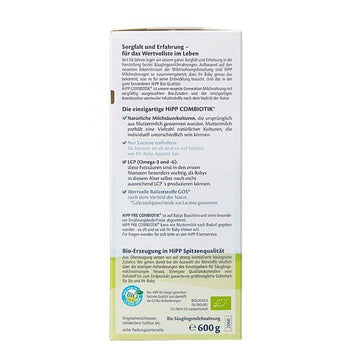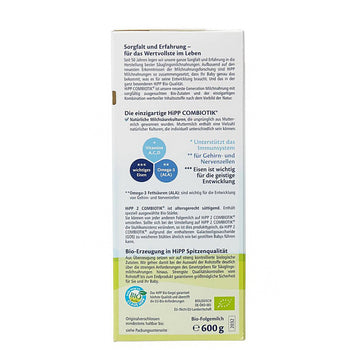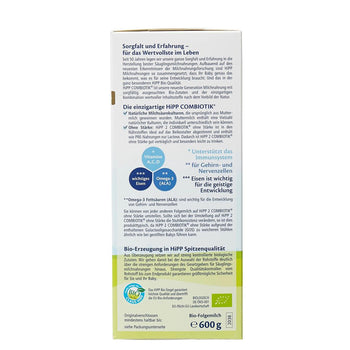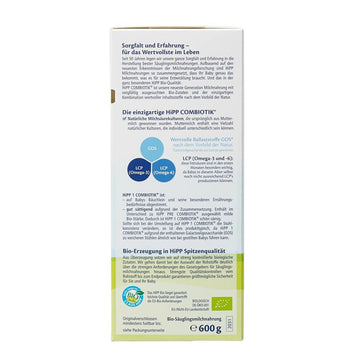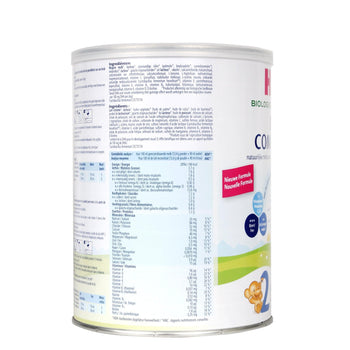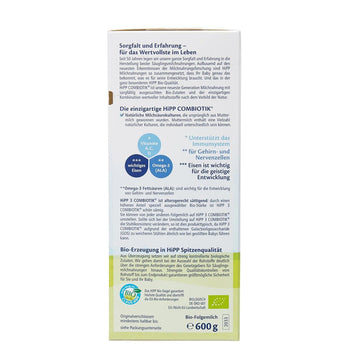Choosing the Best Baby Formula: A Parent’s Guide
Quick Navigation
- Introduction
- Why European Formulas?
- Understanding Baby Formula Basics
- Essential Components That Make Formula Nutritious
- How Baby Formula Differs from Breast Milk
- Key Factors That Determine the Best Baby Formula
- Age-Appropriate Stages
- Organic vs Conventional
- Special Dietary Needs & Sensitivities
- Top European Baby Formula Brands
- How to Understand Differences Between Formulas
- Making the Best Choice for Your Baby
- Common Mistakes Parents Make
- FAQs
- Your Path to Finding the Perfect Formula
Introduction
Choosing the best baby formula can feel overwhelming for new parents. With countless options lining store shelves and conflicting advice from various sources, it's natural to wonder which formula will provide optimal nutrition for your little one. The truth is, the “best” baby formula depends on your baby's individual needs, age, and any specific requirements they may have.
↑ Back to topWhy European Formulas?
European formulas like HiPP Organic, Holle, and Aptamil have gained significant popularity among American parents seeking premium nutrition for their babies. These formulas often exceed U.S. standards in terms of ingredient quality, organic certification, and manufacturing processes. However, understanding what makes one formula better than another requires deeper knowledge of ingredients, stages, and your baby's unique needs.
↑ Back to topUnderstanding Baby Formula Basics: What Every Parent Needs to Know
Baby formula serves as a complete nutritional substitute or supplement to breast milk, providing all essential nutrients your baby needs for healthy growth and development. Modern formulas have evolved significantly since their inception, now offering sophisticated nutritional profiles that closely mimic breast milk composition.
The foundation of quality baby formula lies in its protein source, typically derived from cow's milk that's been modified to be more digestible for infants. This process involves adjusting the whey-to-casein ratio to match breast milk more closely, making it easier for your baby's developing digestive system to process.
↑ Back to topEssential Components That Make Formula Nutritious
Proteins: Modified cow's milk proteins provide essential amino acids for growth and development. Premium formulas use organic sources and careful processing to ensure optimal digestibility.
Carbohydrates: Lactose serves as the primary carbohydrate source, providing energy and supporting calcium absorption. Some formulas may include prebiotics to support digestive health.
Fats: Essential fatty acids, including DHA and ARA, support brain and eye development. European formulas often use higher-quality fat sources compared to conventional options.
Vitamins and Minerals: A comprehensive blend of vitamins and minerals ensures your baby receives all nutrients necessary for healthy development, including iron, calcium, and various B vitamins.
↑ Back to topHow Baby Formula Differs from Breast Milk
While breast milk remains the gold standard for infant nutrition, quality formulas can provide comparable nutrition when breastfeeding isn't possible or when supplementation is needed. Breast milk offers unique immunological benefits and adapts to your baby's changing needs, while formula provides consistent nutrition that you can measure and monitor.
The key difference lies in the bioactive compounds found in breast milk, such as antibodies and enzymes, which can't be replicated in formula. However, premium European formulas bridge this gap by offering superior ingredient quality, organic sourcing, and minimal processing that preserves nutritional integrity.
↑ Back to topKey Factors That Determine the Best Baby Formula
Ingredient Quality: The source and quality of ingredients significantly impact formula effectiveness. European formulas often use organic, grass-fed milk and avoid unnecessary additives like corn syrup, artificial colors, and preservatives.
Manufacturing Standards: European manufacturing standards typically exceed U.S. requirements, resulting in stricter quality control and safer products. Countries like Germany and Switzerland have particularly rigorous standards for organic baby products.
Age Appropriateness: Different stages of formula are formulated for specific age ranges, with adjusted protein levels and nutrient profiles to match your baby's developmental needs.
Special Considerations: Some babies may require specialized formulas for issues like reflux, colic, or food sensitivities. European brands offer excellent specialty options with gentle, organic ingredients.
↑ Back to topAge-Appropriate Stages: From Newborn to Toddler
Stage 1 Formulas (0–6 months)
Stage 1 formulas are specifically designed for newborns and young infants. These formulas have the lowest protein content and are the most similar to breast milk in composition. The whey-to-casein ratio closely mimics breast milk, making it easier for newborn digestive systems to process.
European Stage 1 formulas like HiPP Organic and Aptamil contain essential nutrients like DHA and ARA for brain development, plus prebiotics to support digestive health. The organic certification ensures that milk comes from cows raised without antibiotics or growth hormones on pesticide-free pastures.
Stage 2 Formulas (6–12 months)
As babies grow, their nutritional needs change. Stage 2 formulas contain higher protein levels and additional nutrients to support increased activity and development. These formulas often include iron fortification, which becomes more important as babies' natural iron stores begin to deplete around 6 months.
Stage 2 formulas also support the transition to solid foods, providing consistent nutrition as babies learn to eat and may have irregular solid food intake.
Stage 3 Formulas (12+ months)
Stage 3 formulas, also called growing-up milks, are designed for toddlers and provide nutrition that bridges the gap between infant formula and regular cow's milk. These formulas contain higher levels of calcium and other nutrients needed for active toddlers.
Organic vs Conventional: Making the Right Choice
The choice between organic and conventional formulas can significantly impact your baby's nutrition and long-term health. Organic formulas must meet strict certification standards that ensure ingredients are free from synthetic pesticides, herbicides, and artificial additives.
Organic Benefits: Organic formulas use milk from cows raised on organic farms, meaning no antibiotics, growth hormones, or genetically modified feed. The milk quality is typically superior, with better fatty acid profiles and fewer harmful residues.
Conventional Limitations: Conventional formulas may contain ingredients like corn syrup, artificial flavors, and preservatives that provide no nutritional benefit. The milk may come from cows treated with antibiotics or growth hormones.
European Organic Standards: European organic standards are often more stringent than U.S. standards, particularly regarding processing methods and allowable ingredients. This results in cleaner, more natural products.
↑ Back to topSpecial Dietary Needs and Sensitivities
Hypoallergenic Formulas
For babies with milk protein allergies or sensitivities, partially or extensively hydrolyzed formulas break down proteins into smaller, more digestible pieces.
Reflux Formulas
Specialized formulas for babies with gastroesophageal reflux contain natural thickening agents that help the formula stay down and reduce spitting up.
Lactose‑Free Options
For babies with lactose intolerance, lactose-free formulas provide complete nutrition without digestive discomfort.
Top European Baby Formula Brands: Premium Quality Standards
European baby formula brands have earned recognition worldwide for their commitment to quality, organic ingredients, and rigorous manufacturing standards. These brands often exceed requirements and provide superior nutrition compared to many conventional options. The European Union maintains some of the world's strictest standards for organic certification and baby food safety. This regulatory environment has fostered the development of premium formula brands that prioritize ingredient quality and nutritional excellence.
HiPP Organic: German Excellence in Baby Nutrition
HiPP Organic stands out as one of Europe's most respected baby formula brands, with over 60 years of experience in organic baby nutrition. Founded in Germany, HiPP maintains the highest standards for ingredient sourcing and manufacturing processes.
What Makes HiPP Special: HiPP uses biodynamic and organic farming methods that go beyond standard organic requirements. Their farms are carefully selected and regularly inspected to ensure they meet HiPP's strict quality standards.
Ingredient Quality: HiPP formulas contain organic milk from grass-fed cows, natural lactose, organic vegetable oils, and essential vitamins and minerals. They avoid unnecessary additives like artificial flavors, colors, and preservatives.
Nutritional Profile: HiPP formulas include important nutrients like DHA and ARA for brain development, prebiotics for digestive health, and carefully balanced proteins that are gentle on sensitive stomachs.
Holle Organic: Swiss Quality and Biodynamic Farming
Holle Organic represents the pinnacle of European organic baby nutrition, with roots dating back to 1933. This Swiss-German brand is renowned for its commitment to biodynamic farming and anthroposophical principles.
Biodynamic Excellence: Holle sources ingredients from Demeter-certified biodynamic farms, which follow even stricter standards than organic certification. This ensures the highest quality ingredients with optimal nutritional value.
Pure Ingredients: Holle formulas contain minimal ingredients, focusing on purity and simplicity. They use organic milk, organic lactose, and organic vegetable oils without unnecessary additives.
Gentle Processing: Holle uses gentle processing methods that preserve the natural structure of proteins and nutrients, making their formulas easy to digest and well-tolerated by sensitive babies.
Aptamil: Advanced Research and Development
Aptamil combines European quality standards with cutting-edge research to create formulas that support optimal infant development. Owned by Danone, Aptamil benefits from extensive research and development resources.
Research-Based Formulation: Aptamil formulas are developed based on the latest research in infant nutrition, with particular attention to brain development and immune system support.
Unique Ingredients: Aptamil includes specialized ingredients like GOS/FOS prebiotics, nucleotides, and carefully selected LCPs (Long Chain Polyunsaturated fatty acids) that support healthy development.
European Manufacturing: All Aptamil formulas are manufactured in Europe according to strict EU standards, ensuring consistent quality and safety.
How to Understand Differences Between Baby Formulas
The key to understanding formula differences lies in examining ingredients, nutritional profiles, manufacturing standards, and the specific needs they address. Not all formulas are created equal, and these differences can significantly impact your baby's health and development.
Reading and Comparing Ingredient Lists
Learning to read formula ingredient lists effectively is crucial for choosing the best option for your baby. Ingredients are listed in order of quantity, with the first ingredient being the most prevalent.
What to Look For: High-quality formulas list organic milk or milk proteins first, followed by lactose as the carbohydrate source. Look for added DHA and ARA, essential fatty acids that support brain development.
Red Flags: Avoid formulas with corn syrup or corn syrup solids as primary carbohydrates, artificial flavors, colors, or excessive preservatives. These ingredients provide no nutritional benefit and may cause digestive issues.
European Advantage: European formulas typically have cleaner ingredient lists with fewer additives and higher-quality sources. They often use organic lactose instead of corn syrup and avoid unnecessary additives.
Understanding Nutritional Labels and Values
Nutritional labels provide detailed information about vitamin, mineral, and macronutrient content. Understanding these values helps you compare formulas and ensure your baby receives optimal nutrition.
Key Nutrients: Look for adequate levels of iron, calcium, vitamin D, and essential fatty acids. European formulas often provide these nutrients in easily absorbable forms with optimal ratios.
Protein Quality: The type and amount of protein significantly impact digestibility and nutritional value. Quality formulas use whey and casein in ratios that closely mimic breast milk.
Added Benefits: Some formulas include beneficial additions like prebiotics, probiotics, or nucleotides that support digestive and immune health. These ingredients can provide additional benefits beyond basic nutrition.
Manufacturing Standards: European vs US Regulations
Understanding the regulatory differences between European and U.S. formula manufacturing helps explain why many parents prefer European options for their babies.
European Standards: The European Union maintains strict standards for organic certification, pesticide residues, and manufacturing processes. These standards often exceed U.S. requirements and result in cleaner, safer products.
Ingredient Restrictions: European regulations restrict or ban certain ingredients commonly found in U.S. formulas, such as specific artificial additives and processing aids.
Quality Control: European manufacturers must meet rigorous testing and quality control requirements, including regular inspections and detailed documentation of all processes.
Making the Best Choice for Your Baby's Unique Needs
Choosing the best baby formula requires considering your baby's individual needs, your family's values, and practical considerations like availability and cost. No single formula works perfectly for every baby, so be prepared to adjust based on your baby's response.
Consulting with Your Pediatrician
Your pediatrician should be your first resource when choosing or changing baby formula. They can provide personalized recommendations based on your baby's health, growth patterns, and any specific concerns.
Medical Considerations: If your baby has allergies, reflux, or other health issues, your pediatrician can recommend specialized formulas that address these needs while providing complete nutrition.
Growth Monitoring: Regular checkups allow your pediatrician to monitor your baby's growth and development, ensuring the chosen formula supports healthy progress.
Switching Guidance: If you need to change formulas, your pediatrician can provide guidance on timing and methods to minimize digestive upset during the transition.
Trial and Observation: Finding What Works
Finding the perfect formula may require some trial and observation. Most babies adapt well to high-quality formulas, but individual preferences and tolerances can vary.
Signs of Success: A well-suited formula will result in steady weight gain, regular bowel movements, contentment after feeding, and minimal fussiness or digestive issues.
Warning Signs: Persistent crying, excessive gassiness, frequent spitting up, or unusual bowel movements may indicate the need to try a different formula.
Transition Tips: When switching formulas, do so gradually over several days, mixing increasing amounts of the new formula with decreasing amounts of the old formula.
Common Mistakes Parents Make When Choosing Formula
Many parents make avoidable mistakes when selecting baby formula, often due to marketing influence or incomplete information. Understanding these common pitfalls can help you make better choices for your baby.
- Price-Based Decisions: Assuming that more expensive formulas are automatically better, or choosing based solely on price without considering quality differences.
- Brand Loyalty Without Evaluation: Sticking with one brand without considering whether it's the best fit for your baby's changing needs as they grow.
- Ignoring Individual Needs: Choosing a formula based on general recommendations without considering your baby's specific requirements, sensitivities, or preferences.
- Switching Too Quickly: Changing formulas after just a day or two without giving your baby adequate time to adjust to the new formula.
FAQs About Baby Formula Selection
What makes European baby formula different from U.S. formula?
European baby formulas typically use higher-quality organic ingredients, follow stricter manufacturing standards, and avoid additives like corn syrup and artificial flavors that are common in U.S. formulas. European regulations also require more rigorous testing and quality control measures.
How do I know if my baby is getting the right nutrition from formula?
Signs that your baby is thriving on formula include steady weight gain, regular bowel movements, contentment after feeding, and meeting developmental milestones. Your pediatrician can monitor growth charts and guide nutritional adequacy.
Can I switch between different formula brands?
Yes, you can switch formula brands, but it's best to do so gradually over several days to minimize digestive upset. Mix increasing amounts of the new formula with decreasing amounts of the old formula until the transition is complete.
Are organic formulas worth the extra cost?
Organic formulas offer several benefits, including cleaner ingredients, milk from grass-fed cows raised without antibiotics, and the absence of synthetic pesticides and additives. Many parents find the improved quality and peace of mind worth the additional investment.
What should I do if my baby seems to have trouble with formula?
If your baby shows signs of formula intolerance like excessive fussiness, gas, or digestive issues, consult your pediatrician. They may recommend a different formula type, such as a gentle or hypoallergenic option, or investigate potential underlying issues.
How long should I try a formula before deciding it's not working?
Give a new formula at least 3–5 days for your baby to adjust, unless there are obvious allergic reactions that require immediate attention. Some babies need up to a week to fully adapt to a new formula's taste and composition.
↑ Back to topYour Path to Finding the Perfect Formula
Choosing the best baby formula requires understanding your baby's individual needs, comparing ingredient quality and manufacturing standards, and being willing to make adjustments based on your baby's response. European formulas like HiPP Organic, Holle, and Aptamil offer excellent options for parents seeking premium nutrition with organic ingredients and superior manufacturing standards.
The key to success lies in educating yourself about formula differences, consulting with your pediatrician, and observing your baby's response to find the perfect match. Remember that the best formula is one that provides complete nutrition, supports healthy growth and development, and is well-tolerated by your baby.
By focusing on quality ingredients, appropriate staging, and your baby's unique needs, you can confidently choose a formula that supports optimal health and development throughout your baby's first year and beyond.
↑ Back to top














